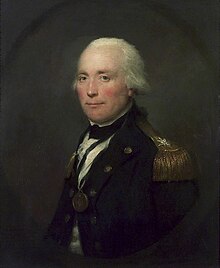Sir Robert Calder
| Sir Robert Calder, Bt | |
|---|---|

Portrait of Robert Calder by Lemuel Francis Abbott, painted 1797
|
|
| Born | 2 July 1745 Kent, England |
| Died |
1 September 1818 (aged 73) Holt, near Bishop's Waltham, Hampshire, England |
| Allegiance |
|
| Service/branch |
|
| Years of service | 1759 to 1818 |
| Rank | Admiral of the White |
| Commands held | Plymouth Command |
| Battles/wars |
Seven Years' War American Revolutionary War French Revolutionary Wars • Battle of Cape St Vincent Napoleonic Wars • Battle of Cape Finisterre War of the Third Coalition |
| Awards | Knight Commander of the Order of the Bath |
Admiral Sir Robert Calder, 1st Baronet, KCB (2 July 1745 – 1 September 1818) was a British naval officer who served in the Seven Years' War, the American Revolutionary War, the French Revolutionary Wars and the Napoleonic Wars.
Robert Calder was born in Kent, England, to Sir James Calder and Alice Hughes, daughter of Admiral Robert Hughes. His father was the 3rd Baronet Calder of Muirton, who had been appointed Gentleman Usher of the Privy chamber to the queen by Lord Bute in 1761. His elder brother, who succeeded to his father's baronetcy, was Major General Sir Henry Calder. Calder was educated in Maidstone, before joining the Royal Navy in December 1758 at the age of thirteen.
Calder initially served aboard his cousin's ship, the 70-gun Nassau, in the American theatre of the Seven Years' War. En route to England, in September 1759, Nassau was dismasted in storm and arrived at her destination with nine foot of water in her hold.
As a Midshipman, Calder received £1,800 in prize money for his part in the capture of the Spanish treasure ship Hermione on 21 May 1762, and was subsequently promoted to Lieutenant. At that rank he served aboard HMS Essex, under Captain the Hon. George Faulkner, in the Caribbean. In 1780 he attained the rank of Post-Captain. He commanded the frigate HMS Diana under Admiral Richard Kempenfelt, and acquitted himself honourably in the various services to which he was called, but for a long time had no opportunity of distinguishing himself.
...
Wikipedia
